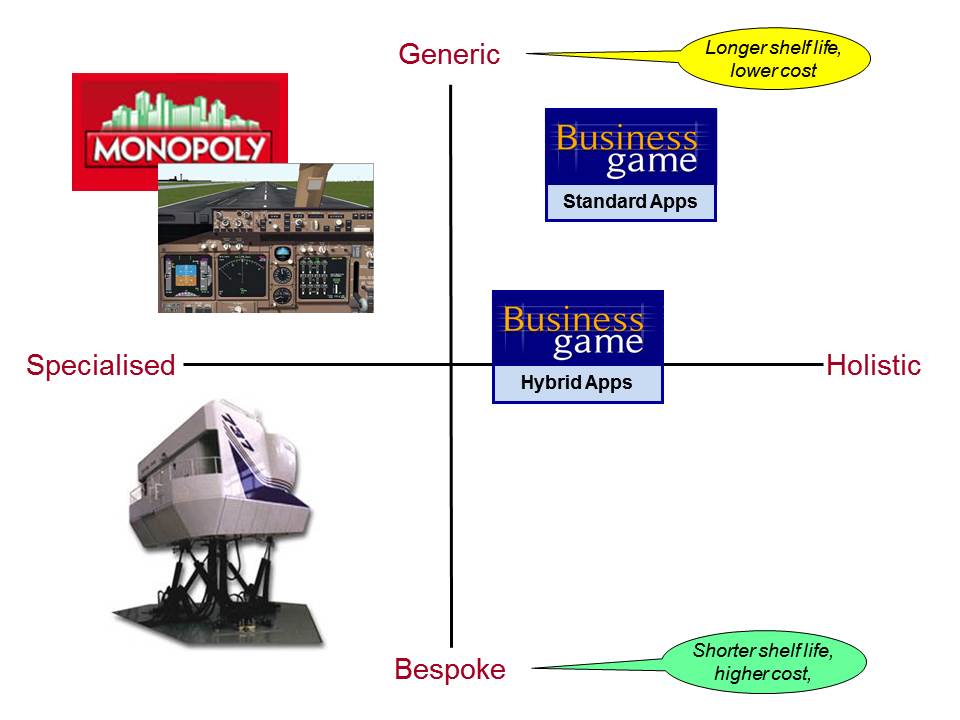Darwin showed that to survive, animals needed to adapt and evolve.
He also recognised that the direction and the pace of evolution was determined by changes in the environment.
As businesses evolve, a market downturn or credit crunch can pose similar threats.
The challenge is not whether to adapt but what, where, when, why and how - and that's where simulations can make a unique contribution.
Simulations have adapted and evolved into four basic types:

Bespoke and Generic
Bespoke simulations can address strategic, time-critical and sensitive issues in particular market sectors. However, the cause and effect relationships in the business model which underpins a bespoke simulation must mirror behaviour in the real world with unerring accuracy. This type of simulation is often used to support decision-making leading up to a major investment - such as the number and location of mobile phone masts. Because of the large amounts of money at stake, this type of simulation usually requires senior executives of the organisation concerned to commit massive amounts of time. This invariable means high cost, which is why this type of simulation tends to be restricted to large organisations with deep pockets. There is also a real risk of limited shelf-life, since the market could easily by transformed by the arrival of a new competitor, or an unexpected technological breakthrough.
As the name implies, generic simulations focus on improving awareness and understanding of the business principles and cause-and-effect relationships that apply to businesses across all sectors. Applications range from team-building to problem-solving. While these simulations can be just as complex and time-consuming to develop and test, the wider range of applications allows costs to be amortised over a much larger number of events for a much longer period, making them far more cost-effective. Generic simulations have a further advantage. Significant differences from typical real world situations can be incorporated deliberately. Examples could be interest rates, price levels or labour costs. In this way, participants can be encouraged to challenge all of their assumptions. This often uncovers misperceptions which are causing undesirable consequences in the real world.
Specialised and Holistic
Specialised business simulations focus on a specific aspect of a business, such as marketing strategy, financial analysis or project management. These are used by organisations to improve performance in particular disciplines. For example, with staff rostering simulations, a generic version might be used to provide a deeper understanding of the core principles while a bespoke version could be used to ensure that the right number of flying instructors were available to meet a fluctuating demand for pilots.
Holistic simulations, in contrast, bring together all of the primary functions of an organisation. This enables staff from different departments or backgrounds to "learn each others' languages". In this way, they can develop a deeper understanding of how decisions in one area produces consequences in another - a highly effective way to minimise or even avoid conflict when teams are under pressure.
Business Games are holistic and generic, covering multiple disciplines in almost any sector. A typical challenge is to turn round an under-performing company in a highly competitive market. The economic climate is unpredictable, just as in real life. Each management team determines its own strategy and sets its own policies.
Since each of us has just one internal set of behaviours, our response in a realistic simulated environment is identical to that in the real world. Initially, the will to win motivates adaptability. As successes accumulate, the process of seeking continuous incremental improvement becomes a deeply-embedded commitment.
As simulations eliminate the delay between decisions and consequences, several years’ worth of knowledge and experience can be acquired in a few hours. The more diverse the background, personalities, skills and cultures in a team, the more likely it is that assumptions will challenged and that new answers emerge.
More Articles